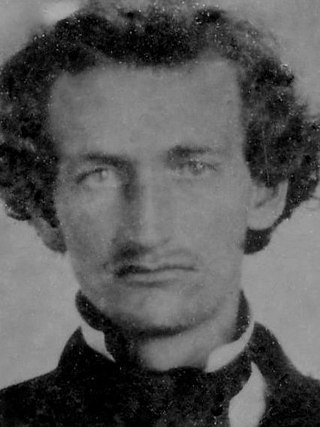Related Research Articles

The Ark-La-Tex is a socio-economic tri-state region where the Southern U.S. states of Arkansas, Louisiana, and Texas join together. The region contains portions of Northwest Louisiana, Northeast Texas, and South Arkansas as well as the extreme southeastern tip of Oklahoma, in McCurtain County, partly centered upon the Red River, which flows along the Texas–Oklahoma state line into Southwestern Arkansas and Northwest Louisiana.

The Brooks–Baxter War, also known as the Brooks–Baxter Affair, Arkansas Civil War, or the Second American Civil War was an attempt made by failed gubernatorial candidate Joseph Brooks of the “Brindle-tail” faction of Arkansas' Republican Party to take control of the state from Elisha Baxter, who was the Republican governor. The victor in the end was the Baxter administration, also known as the "Minstrels", supported by some "carpetbaggers" and Democrats over the Brindle-tails supported by "scalawags" and "freedmen".

Augustus Hill Garland was an American lawyer and Democratic politician from Arkansas, who initially opposed Arkansas' secession from the United States, but later served in both houses of the Congress of the Confederate States and the United States Senate, as well as becoming the 11th governor of Arkansas (1874–1877) and the 38th attorney general of the United States (1885–1889).
The Constitution of Arkansas is the primary organizing law for the U.S. state of Arkansas delineating the duties, powers, structures, and functions of the state government. Arkansas' original constitution was adopted at a constitutional convention held at Little Rock in advance of the territory's admission to the Union in 1836. In 1861 a constitution was adopted with succession. After the American Civil War its 1864 constitution was drafted. An 1868 constitution was passed to comply with the Reconstruction acts. The current constitution was ratified in 1874 following the Brooks–Baxter War.
More than 1,500 African American officeholders served during the Reconstruction era (1865–1877) and in the years after Reconstruction before white supremacy, disenfranchisement, and the Democratic Party fully reasserted control in Southern states. Historian Canter Brown Jr. noted that in some states, such as Florida, the highest number of African Americans were elected or appointed to offices after the end of Reconstruction in 1877. The following is a partial list of notable African American officeholders from the end of the Civil War until before 1900. Dates listed are the year that a term states or the range of years served if multiple terms.

James M. Hinds was the first U.S. Congressman assassinated in office. He served as member of the United States House of Representatives for Arkansas from June 24, 1868 until his assassination by the Ku Klux Klan. Hinds, who was white, was an advocate of civil rights for black former slaves during the Reconstruction era following the American Civil War.

Louisianian, also referred to as New Orleans Louisianian and The Louisianian was a semi-weekly newspaper published in New Orleans, Louisiana. The Louisianian was founded in 1870 by P. B. S. Pinchback (1837–1921), an African-American legislator who was elevated to governor of Louisiana in 1872. The paper's motto was “Republican at all times, and under all circumstances”. It was one of the few 19th-century African-American newspapers that sought both black and white readers.

The California Digital Newspaper Collection (CDNC) is a freely-available, archive of digitized California newspapers; it is accessible through the project's website. The collection contains over six million pages from over forty-two million articles. The project is part of the Center for Bibliographical Studies and Research (CBSR) at the University of California Riverside.
The following is a timeline of the history of the city of Little Rock, Arkansas, US.

The Opelika-Auburn News is a daily newspaper in Alabama, serving Opelika, Auburn, and the communities surrounding Lee County. The newspaper serves to report local, weather, sports, and entertainment news within the areas.
The American Republican and Baltimore Daily Clipper was a newspaper published in Baltimore, Maryland in the mid-1800s. The paper supported slavery but opposed Confederate secession in the American Civil War, based on the premise that it would be possible to maintain slavery under the Union.
The Hermanner Volksblatt was a weekly German newspaper published in Hermann, Missouri from around 1856 until 1928. In the early 1870s, the paper briefly changed publishers and was known as the Gasconade Zeitung and the Hermanner Volksblatt und Gasconade Zeitung, before returning to its original name where it remained until April 18, 1928.

James T. White was a Baptist minister and state legislator from Helena and Little Rock, Arkansas. He was a member of the Arkansas House of Representatives and later the Arkansas Senate in the late 1860s and early 1870s. He was also a member of the Arkansas constitutional conventions in 1868 and 1874. He edited the Baptist newspaper, The Arkansas Review. He was an African American and a Republican. In 1868 he was among the first six African Americans to serve in the Arkansas House.

Greene Shadrach Washington Lewis was a leader among African Americans and a state legislator in Alabama during the Reconstruction era 1868–1876. He represented Perry County, Alabama.
William L. Copeland was a police officer, government official, and state legislator in Arkansas. He was born in Ohio and studied at Oberlin College in Ohio. On March 7, 1865, at the end of the American Civil War, he joined Company C, 2nd Ohio Cavalry Regiment, of the Union Army. At the end of the war, he returned to Oberlin College, where he studied from 1867–69.
Edward Allen Fulton was an American newspaperman, abolitionist, postmaster, farmer, and politician. He represented Drew County, Arkansas in the Arkansas House of Representatives in 1871. After being enslaved in Missouri, he became an abolitionist and lived in Chicago. He returned to the south after the American Civil War. He was an advocate of civil rights for African Americans. He campaigned to be Arkansas Secretary of State. He survived an assassination attempt.
Carl H. Moneyhon is an American historian and professor. He received his Ph.D from University of Chicago in 1973 with a thesis "The Republican Party and Texas politics 1865–1874".
Jules A. Masicot was a state legislator in Louisiana. He served in the Louisiana House of Representatives and Louisiana State Senate and at the state's 1868 constitutional convention.
References
- ↑ "Morning Republican (Little Rock, Ark.) 1868-1872". Library of Congress.
- ↑ "Little Rock Daily Republican ([Little Rock, Ark.]) 1872-1876". Library of Congress.
- ↑ "History, Philosophy and Newspaper Library Newspaper Database". www.library.illinois.edu.
- ↑ "Auburn University". Auburn University.
- ↑ Glasrud, Bruce A.; Smallwood, James (November 7, 2007). The African American Experience in Texas: An Anthology. Texas Tech University Press. ISBN 9780896726093 – via Google Books.
- ↑ "Little Rock Notices". twain.lib.virginia.edu.
- ↑ Milner, Clyde A.; Cannon, Brian Q. (October 3, 2019). Reconstruction and Mormon America. University of Oklahoma Press. ISBN 9780806165547 – via Google Books.
- ↑ Star, Tulsa (December 23, 2019). "The Victory of Greenwood: O.W. Gurley". Archived from the original on March 5, 2020. Retrieved November 7, 2020.